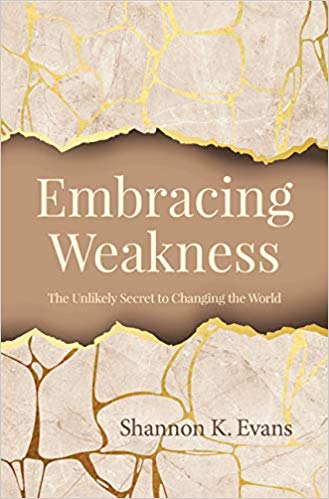I recently read Embracing Weakness: The Unlikely Secret to Changing the World while traveling home from a work trip to Dallas, and it nearly brought me to tears right there on a plane full of strangers.

In this book, Shannon Evans holds up a mirror we often do our best to avoid looking into.
We engage in self-numbing (shopping, Netflix, social media, drinking, etc) to avoid the realities of own weaknesses. We refuse to let others serve us to maintain feelings of being the needed rather than the needy. And so much more. Denying, completely ignoring, or even working like crazy to overcome our weaknesses rather than face them seems to be the norm in our culture.
Below are just some of the many passages I highlighted and will be thinking and praying about in the months ahead.
- “When we do attempt to follow Jesus’ model of the works of mercy, there is a tangible sense of relief when the service is over and we can go back to online shopping and dinner at our favorite restaurant.”
- “A heart deadened to its own struggle can never be a refuge for the struggles of others.”
- “Even though they live radically simple lives, many are plagued with the consumption of experience. Always looking for the next thing, the next adventure, the next opportunity to travel, they seek to outrun discomfort in search of their own personal form of pleasure. They struggle to put down roots and invest deeply and meaningfully in a community. This is it’s own form of consumerism.”
- “…the danger comes when we use them [numbing agents and consumption] to replace the hard inner work of opening up our emotions to God and the people he has put in our lives.”
- “We counter the lie of scarcity with the discipline of generosity.”
- “While every internal and external message we receive is telling us to fight for esteem, the example of our incarnated Lord quietly bids us to see the wisdom in his weakness.”
- “In the Incarnation, God has proved the lengths to which he is willing to go to show us he knows and understands our plight. In the pages of the Gospels, we watch the uncreated God experience physical limitations, painful relationships, public criticism, loneliness, temptation, grief, and more. Jesus’ sacrifice is staggering; his commitment to solidarity is almost unbelievable to the human heart. “Stop,” we say, “that’s enough now.” We see where the story is headed and our insides groan in discomfort. “God can’t die,” we shiver. It’s like a horror movie we can’t look away from. But he didn’t stop…”
- “…seeing suffering as a natural consequence of what someone has either done or failed to do allows us to hope we might be exempt if we play our cards right. We silently comfort ourselves with accusatory explanations that seek to alleviate our own fears that such devastation could happen to us…”
- “…we are all in need and we are all able to give, therefore no one serves another without gaining something from him or her.”
- “…learn about the needs of a community and how to equip the community members to meet those needs themselves…”
- “Feed the man dying of hunger, because if you have not fed him, you have killed him”
Shannon’s personal stories woven throughout give us a glimpse into her life and make her perspective all the more real. She knows the struggles of wrestling against weakness because she has lived it herself through her vocation as a wife, mother, member of a Catholic Worker community, and former evangelical missionary.
Thankfully, she doesn’t leave us to wallow where we’re at with vague platitudes about trying to do better. Shannon offers actionable tips for growing in virtue, ideas for incorporating the corporal works of mercy into family life, and ultimately, encourages us to embrace the weaknesses that make us all human.
You can read the entire first chapter on her blog now, and purchase the full book on Amazon. Highly recommend!
(This isn't a sponsored post; I'm not being paid to write this. I just think it's well worth the investment of time and money to read it!!)
